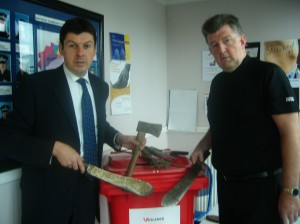 Every new leader deserves a chance to flourish, so the epithet goes. It was a decency that was afforded Iain Gray, Wendy Alexander, Gordon Brown and, currently (though weaning), Ed Miliband. So it is only fair to wipe Johann Lamont’s slate clean and wait with optimism and hope that she shall lead a rejuvenated and energised Labour party that will strengthen Scotland through effective opposition to the SNP Government.
Every new leader deserves a chance to flourish, so the epithet goes. It was a decency that was afforded Iain Gray, Wendy Alexander, Gordon Brown and, currently (though weaning), Ed Miliband. So it is only fair to wipe Johann Lamont’s slate clean and wait with optimism and hope that she shall lead a rejuvenated and energised Labour party that will strengthen Scotland through effective opposition to the SNP Government.
That said, one can’t help but think that as the SNP enters a long-craved campaign period leading up to the independence referendum, that if the Nats themselves could pick who the leader of Scottish Labour (sic) would be, they would pick someone precisely like Johann Lamont.
Wedded to the decaying force that are union leaders, inflexible on the question of independence for Scotland, often guilty of being an off-putting ‘point and shout’ politician, responsible for MPs who have no desire to be bossed around by a mere MSP, a leader who one can imagine would hold the line in the face of defeat when a change in tactics is clearly desperately required and, not that this should necessarily be held against anyone, doesn’t come across as the cheeriest soul in a nation famous for being pretty dour already. Some would say.
Add to all of this the clear probability that Johann Lamont’s leadership is already undermined by Ken Macintosh being the Labour members’ choice, receiving as he did 52% of the popular vote amongst members, and we have problems upon problems. Ken is to Johann what David Miliband is to brother Ed; a perennial reminder that the wrong person got the job due to a bizarre, byzantine electoral college system
But she deserves a chance.
Labour needs to do many things to reclaim former glories and many have postulated over what some of those should be.
Contrary to Alan Cochrane’s urging, I do not believe that constantly pressing the SNP over the date of the independence referendum will get Labour anywhere. The SNP won the election fair and square and, unless Labour can point to a deep and damaging reason why not knowing this date is causing Scotland harm, the public won’t mind (or really care) when the referendum is, safe in the knowledge that it’ll happen in a few years’ time. All that will happen is that Labour will look like it’s moaning (again) and the SNP will look reasonable (again). All the while, the constitution continues to dominate Scottish politics which in turn suggests that MSPs don’t have anything important to talk about on health, education, crime etc etc.
So what Labour needs to do is drop the constitution altogether as a talking point. If they claim the SNP is ‘obsessed’ with the topic, then highlight that supposed fact by being the polar opposite. If Labour believes in devolved Scotland within the UK being the ideal model of governance then magnify that. A blizzard of Holyrood-level proposals that are thought through and genuinely believed in, irrespective of other parties’ positions on the matters, should be pushed forward in the next six months or so by the Shadow Minister responsible for them. The young talents of Kezia Dugdale and Jenny Marra should be unlocked and unleashed alongside commentary from the pleasingly familiar Hugh Henrys, Sarah Boyacks and Malcolm Chisholms.
Alex Salmond does not need to be nobbled, he will go of his own accord before too long. It shouldn’t be about leader vs leader, as Labour’s hustings so often had it, it’s about team vs team.
So, if devolved Scotland is Labour’s chosen ball game and the SNP’s focus is on independence, which party is going to look like it is caring for Scots more in the years running up to an independence referendum, a referendum that polls continue to suggest the SNP will lose? And if that is the case, who is best placed to win the election in 2016 if the referendum delivers a No vote?
Not that the SNP makes it easy for Labour, and other opposition parties, by having so few chinks in its armour and running an economy that is powering along nicely, third in the UK only to London and the South East.
Johann could nullify SNP successes by getting on board with minimum pricing and NHS spending while playing to her strengths by utilising union power and know-how to find the fairest model for a national minimum wage, apprenticeships, taxation levels, regulation and pensions that pushes her ahead of an SNP that wants to be free-marketeers and social democrats all at the same time. It is an awesome task to consider but Johann could pull Labour more left, more Socialist, than the Nationalist big tent is willing to stretch and therein lies success within Holyrood and, by extension, at the referendum, whenever it may be.
I personally don’t believe that Johann will be able to do it as I don’t believe the above is a strategy that will be embarked upon, the ever-shrinking middle ground will remain the battlefield, and I also sensed a glint in Johann’s eyes on the day of her victory that even she believes she’s not quite up to this.
But she deserves a chance.

